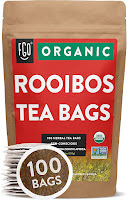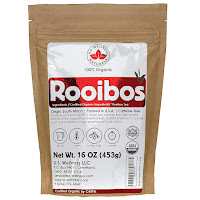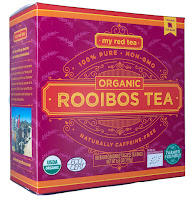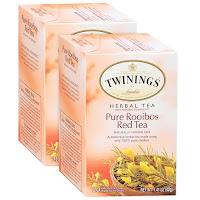The Surprising Health Benefits of Rooibos Tea: A Delicious and Nutritious Alternative to Traditional Brews
Rooibos is renowned for its high levels of antioxidants. Although further studies are required, it has been suggested that it may offer a range of advantages and even help to safeguard against certain chronic conditions. Its unique flavor and lack of caffeine have made it a popular choice globally, having been enjoyed for centuries in southern Africa. Advocates have celebrated Rooibos for its capacity to combat cancer, heart disease, and stroke through its rich antioxidant content. In this article, we delve into the health benefits of Rooibos tea and explore potential side effects.
What Is Rooibos Tea?
Rooibos tea is a type of herbal tea that is made from the leaves of the Aspalathus linearis plant, which is native to South Africa. The leaves of the plant are harvested, fermented, and dried, and then brewed to make a flavorful and aromatic tea. Unlike traditional teas such as black or green tea, rooibos tea is naturally caffeine-free and low in tannins, which makes it a great alternative for people who are sensitive to caffeine or who want to avoid the negative effects of tannins on iron absorption. Rooibos tea is also rich in antioxidants and has been associated with a range of health benefits, although more research is needed to confirm these claims. It is often enjoyed plain, but can also be served with milk or honey.
Health Benefits Of Rooibos Tea
Are there any rooibos tea benefits? Rooibos tea has been associated with a range of potential health benefits, although more research is needed to confirm these claims. Here are some of rooibos tea benefits:
1. Rich in antioxidants: Rooibos tea contains high levels of antioxidants, which can help to protect cells from damage caused by free radicals and may reduce the risk of chronic diseases.
(Aspalathin from Rooibos) (Antioxidant Capacity of Rooibos)
2. Improves heart health: The second benefit of rooibos tea is improving heart health. Some studies have suggested that rooibos tea may help to reduce the risk of heart disease by improving blood lipid levels and reducing inflammation.
In a research study published in 2011 and cited as a trusted source, a group of 40 individuals who were deemed to be at risk of developing cardiovascular disease were instructed to consume a daily intake of six cups of rooibos tea over the course of six consecutive weeks. The objective of the study was to determine the potential impact of rooibos tea consumption on the cardiovascular health of the participants, and to assess any changes in their overall wellbeing as a result of the intervention.
3. Supports bone health: Rooibos tea is a good source of minerals like calcium, magnesium, and manganese, which are important for maintaining strong bones and teeth. According to a 2019 study posted on "Beverages", red rooibos tea stimulates osteoblast mineralization in a dose-dependent manner.
4. Promotes digestion: Rooibos tea has been shown to have anti-spasmodic properties, which may help to soothe the digestive system and relieve stomach cramps.
5. May help to manage diabetes: Some studies have suggested that rooibos tea may help to regulate blood sugar levels and improve insulin sensitivity, which could be beneficial for people with diabetes.
Extensive research involving animal subjects has been conducted to investigate the numerous health benefits associated with rooibos tea consumption. One such study, which was focused on identifying the therapeutic effects of the antioxidant aspalathin found in rooibos tea, revealed promising results with regard to its potential antidiabetic properties. The research suggested that aspalathin could help regulate blood sugar levels in individuals suffering from diabetes, thus reducing the risk of developing complications associated with this metabolic disorder.
Moreover, another research study has highlighted the potential of aspalathin in preventing vascular inflammation resulting from high blood sugar levels. Vascular inflammation, which is a common occurrence in individuals with diabetes, can lead to a host of serious health problems such as heart disease, stroke, and neuropathy. By suppressing this inflammatory response, aspalathin can potentially reduce the risk of developing these life-threatening conditions.
In summary, the findings of animal research indicate that aspalathin, a key component found in rooibos tea, has the potential to offer significant health benefits, particularly in the management and prevention of diabetes and related complications. Furthermore, its ability to suppress vascular inflammation underscores the potential of this powerful antioxidant in promoting overall cardiovascular health.
6. May reduce the risk of cancer: Rooibos tea contains several compounds that have been shown to have anti-cancer properties, although more research is needed to confirm its effectiveness.
7. Stimulate Weight-loss: The issue of weight management has become increasingly prevalent in modern society, with many individuals seeking effective strategies for achieving and maintaining a healthy body weight. Rooibos tea has emerged as a popular beverage option among health-conscious individuals due to its calorie-free nature, making it an attractive alternative for those looking to shed a few pounds.
Moreover, a research study published in 2014 and cited as a trusted source, explored the potential weight management benefits of rooibos tea consumption. The study findings indicated that the tea could positively impact weight management by increasing levels of the hormone leptin. Leptin is a crucial hormone that plays a key role in regulating food intake and satiety, sending signals to the body when it has had enough food.
Furthermore, the study results demonstrated that rooibos tea consumption could prevent the formation of new fat cells and enhance the metabolism of existing fat cells, leading to quicker fat breakdown and aiding in weight loss efforts.
Overall, rooibos tea is a delicious and healthy beverage that may offer a range of health benefits. However, it is important to remember that these claims are not yet fully supported by scientific evidence, and more research is needed to confirm its effectiveness for specific health conditions.
Does Rooibos Tea Have Caffeine?
Rooibos tea has gained popularity among individuals who are seeking caffeine-free beverage options, particularly those who may be sensitive to caffeine, pregnant individuals, or children. This is because rooibos tea is entirely free from caffeine, making it a safe and effective alternative to other caffeinated beverages.
While caffeine is widely regarded as a stimulant that can offer some health benefits, not everyone can consume it safely. In some cases, excessive caffeine intake can lead to negative side effects, such as interference with sleep, worsened anxiety, jitteriness, and heart palpitations, among others. These effects can be particularly pronounced in individuals who are sensitive to caffeine or who may be vulnerable to its adverse impacts, such as pregnant individuals, young children, or people with underlying medical conditions.
Unlike popular caffeinated beverages such as black tea, green tea, and coffee, rooibos tea does not contain any caffeine. This makes it an excellent alternative for individuals who are looking to reduce their caffeine intake or avoid it entirely. Moreover, the absence of caffeine in rooibos tea does not compromise its potential health benefits, which include its high antioxidant content and potential to support cardiovascular health.
Rooibos tea is a caffeine-free alternative to popular caffeinated beverages and may be a suitable option for individuals who are sensitive to caffeine or who are seeking to reduce their caffeine intake. Its lack of caffeine does not detract from the potential health benefits associated with its consumption, making it an excellent choice for those who wish to maintain a healthy lifestyle while still enjoying a warm and comforting cup of tea.
Does Rooibos Tea Interfere With Medications?
Rooibos tea is generally considered safe for consumption and is not known to interact with most medications. However, as with any other herbal supplement or dietary supplement, it is always best to consult with a healthcare provider before consuming rooibos tea if you are taking any medications.
Some medications may interact with the specific compounds present in rooibos tea, and it is essential to check with a healthcare provider if it is safe to consume the tea alongside any medications. For example, rooibos tea may increase the risk of bleeding when taken alongside blood-thinning medications such as warfarin or aspirin. In this case, it is best to avoid consuming rooibos tea or speak with a healthcare provider before doing so.
Additionally, rooibos tea may interfere with the absorption of iron from food or supplements, which can be of concern for individuals with iron deficiency anemia or taking iron supplements.
In conclusion, rooibos tea is generally safe for consumption and is not known to interact with most medications. However, it is essential to speak with a healthcare provider before consuming rooibos tea if you are taking any medications to avoid any potential interactions or adverse effects.
Rooibos Tea Pregnancy
Rooibos tea is generally considered safe for consumption during pregnancy. Unlike black and green tea, rooibos tea is naturally caffeine-free, which is a significant advantage for pregnant women as high caffeine intake has been linked to adverse pregnancy outcomes.
Moreover, rooibos tea contains various beneficial compounds, such as antioxidants and flavonoids, which may help support overall health during pregnancy. Additionally, some studies have suggested that rooibos tea may help relieve common pregnancy symptoms such as nausea and digestive issues.
However, despite the potential benefits, it is still important to consume rooibos tea in moderation during pregnancy, as with any other herbal supplement or dietary supplement. It is recommended to limit intake to no more than 1-2 cups per day, especially during the first trimester.
Furthermore, it is always best to consult with a healthcare provider before consuming rooibos tea or any other herbal supplement or dietary supplement during pregnancy to ensure that it is safe for you and your growing baby.
What Are Rooibos Tea Side Effects?
Rooibos tea is generally considered safe for consumption and is associated with very few side effects. However, as with any other dietary supplement or herbal product, some individuals may experience adverse effects from consuming rooibos tea.
Some possible side effects of rooibos tea consumption include:
1. Allergic reactions: Some people may be allergic to rooibos tea, which can cause skin rash, itching, or hives.
2. Low blood pressure: Rooibos tea may lower blood pressure, so individuals with low blood pressure should monitor their blood pressure closely while consuming the tea.
3. Iron absorption: Rooibos tea may interfere with the absorption of iron from food or supplements, which can be of concern for individuals with iron deficiency anemia or taking iron supplements.
4. Liver damage: Although rare, there have been a few reports of liver damage associated with rooibos tea consumption. However, more research is needed to confirm this association.
5. Pregnancy: Pregnant women should consume rooibos tea in moderation, as excessive intake may lead to adverse pregnancy outcomes.
It is always best to consult with a healthcare provider before consuming rooibos tea or any other dietary supplement or herbal product, especially if you have any underlying medical conditions or are taking any medications, to avoid any potential adverse effects.
How Do You Pronounce Rooibos Tea?
Rooibos tea is pronounced as "ROY-boss tea." The word "rooibos" is of Afrikaans origin and is pronounced as "ROY-boss" in the Afrikaans language, which means "red bush." Now you know how Rooibos tea pronounce as.
Rooibos Tea Taste
Rooibos tea has a unique taste that is often described as sweet and slightly nutty, with a hint of vanilla or caramel. It is naturally caffeine-free and has a slightly earthy and slightly sweet taste, with a smooth and slightly creamy mouthfeel. The taste of rooibos tea can be influenced by factors such as the quality of the tea, the brewing method used, and the addition of other ingredients like milk, honey, or lemon. Some people also detect a slight floral or herbal note in rooibos tea. Overall, rooibos tea has a pleasant and refreshing taste that is enjoyed by many tea lovers.
Where to Buy Rooibos Tea?
You can find a wide variety of rooibos tea options online, from loose leaf to tea bags, and from different brands and flavors. Websites like Amazon, Thrive Market, and iHerb have a large selection of rooibos tea options. Many grocery stores carry rooibos tea in the tea and coffee aisle. Look for brands like Twinings, Celestial Seasonings, or Numi Organic Tea.
When buying rooibos tea, be sure to check the ingredients list to ensure that it is pure rooibos tea without any added ingredients or flavors. Additionally, consider buying organic and fair trade rooibos tea to support sustainable farming practices and ensure a high-quality product.
Here are the best Selling Rooibos Tea Brands:
Final Verdict on Rooibos Tea
For those seeking a caffeine-free tea option, rooibos tea is a good alternative to black or green tea. Tannins, which are naturally occurring in some teas, can also be a concern for some people due to their astringent taste and potential for digestive discomfort. Rooibos tea offers a tannin-free option for those looking to avoid them.
Apart from being caffeine and tannin-free, rooibos tea is also a good source of antioxidants that may be beneficial for the heart and liver. Antioxidants help protect the body from free radicals, which can cause cell damage and contribute to the development of various diseases.
However, it is important to note that research into the potential health benefits of rooibos tea is limited. Many of the existing studies have been conducted on animals and human cells, and further research is needed to determine its effectiveness in humans.
Despite the limited research, rooibos tea is generally considered safe for consumption, and any potential health benefits are considered a bonus. So, most people can enjoy drinking it without any risks. However, as with any dietary supplement or herbal product, it is always recommended to consult with a healthcare provider before adding rooibos tea to your diet, especially if you have any underlying medical conditions or are taking any medications.










Comments
Post a Comment